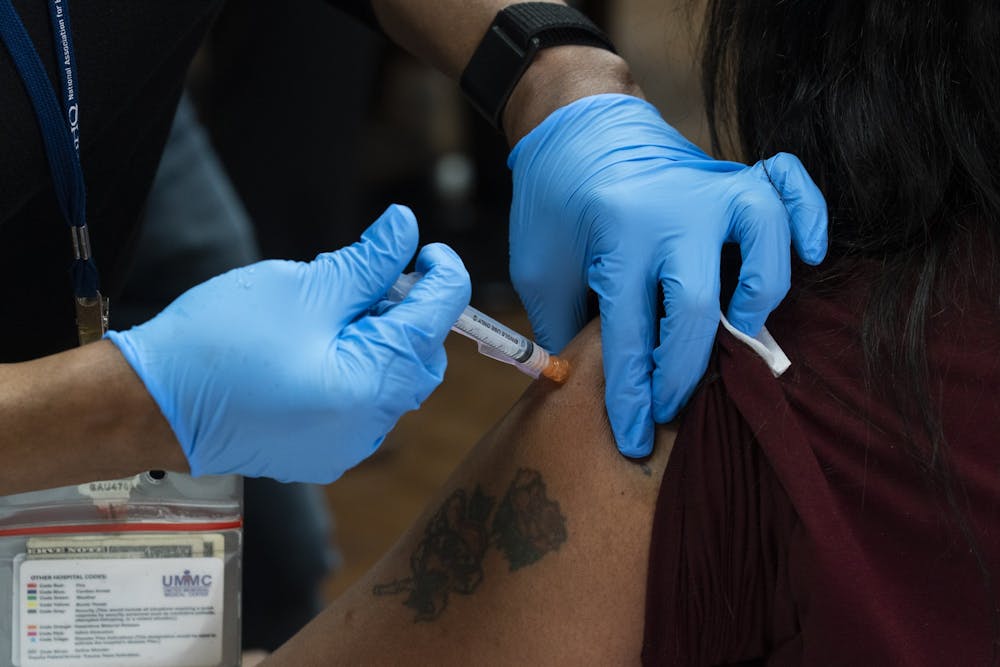Junior Nina Harrod, an IU nursing student, was initially afraid to receive the COVID-19 vaccine.
When IU made vaccines available to nursing students working with COVID-19 patients, Harrod said her first instincts were to consult her mother and fellow nursing students. Although she was still nervous, she decided to get vaccinated. Her concerns faded after the shot — she experienced no side effects.
“I just want to make other people trust it,” Harrod said.
After a long history of doctors abusing Black people for medical experiments, members of the Black community are apprehensive about receiving COVID-19 vaccines, according to an article by Charlie Nelms, IU’s former vice president of institutional development and student affairs. Some IU students and experts are speaking publicly to encourage Black people to get the vaccine despite their concerns.
Harrod said she posted about her vaccination on Snapchat but received criticism from strangers and acquaintances who believed the shot was dangerous. Data from Pfizer, BioNTech and clinical trials show the vaccines are safe and effective, according to the Centers for Disease Control and Prevention website.
Related: [IU to distribute COVID-19 vaccine to students, faculty, staff for free]
In his article, “Why I Plan to Take the COVID Vaccine and You Should Too,” Nelms encouraged people to get the vaccine despite the history of medical malpractice against the Black community.
“I don't want to be so fixated on the history of systemic racism that we've missed the point about what we need to do to be responsive now,” he said.
Dr. Zandra D'Hue, a Black Assistant Professor of Clinical Pathology and Laboratory Medicine at the IU School of Medicine, said the vaccines in use in the United States are safe and effective.
Common side effects of the COVID-19 vaccine include pain, swelling, a headache, chills or fever, according to the Centers for Disease Control and Prevention. While serious side effects such as allergic reactions can occur, they are rare, according to the CDC.
Nelms was vaccinated earlier this month and felt no side effects, he said at a Jan. 20 IU webinar. He said he has lost a brother, an aunt, a cousin and multiple friends to COVID-19.
“I've seen this virus, the impact of the virus up close,” he said. “It's a personal kind of matter for me.”
Junior Daveon Melton, public relations chair for IU’s Culture Club, said he does not plan to receive the vaccines currently available, citing his distrust in the government and what he views as suspiciously fast vaccine development.
D’Hue said she is confident the results of the clinical trials and the amount of safe vaccinations recorded show the safety of the shot. She said she trusts the three-phase approval system for the vaccine and received both doses of the Pfizer vaccine in January.
D’Hue also said development went quickly because of previous research on the SARS class of viruses, of which COVID-19 is a member.
The vaccine underwent all of the normal safety and efficacy studies, D’Hue said. Multiple studies were run at the same time to develop the vaccine faster than the standard three- to six-year time frame.
“A difference between this emergency development and the normal development is that a lot of the steps were done simultaneously,” she said.
More than half a million Hoosiers have received at least one dose of the COVID-19 vaccine, she said. No losses of neurological skills, motor skills or deaths have resulted from vaccinations in Indiana.
In a November 2020 Pew Research study, 39% of U.S. adults surveyed said they would not get the vaccine. Of that group, 53% said they were “pretty certain” they would not receive a COVID-19 vaccine once others were vaccinated and more information is available.
Close to two weeks ago, Junior Ashley Elane, president of IU’s Culture Club, said she did not think the current vaccine was trustworthy and would have to see the effects on family and community members who received the shot before she would consider taking it.
“Right now, I'm definitely at a no,” she said. “I still think about it, so it's not a no forever.”
About two weeks later, Elane said she is now considering the shot after her grandfather reacted well to the vaccine.
Based on her experience as a pathologist, D’Hue said the vaccine can be trusted.
“I wouldn't want to pressure anyone to get the vaccine, but I personally do feel that it is safe and effective,” she said.
Junior Ky Freeman, president of IU’s Black Student Union, said student to student encouragement is an effective way to promote vaccination.
“They would listen to people who look like them, is out there on the ground just like them, as opposed to people who they might not see all that often,” he said.
Freeman plans to be vaccinated to ensure public safety, but recognizes that the Black community at IU is on edge with the disproportionate impact of the virus on the Black community and the history of medical malpractice against Black populations.
Freeman is still a little uneasy about getting the shot, but he said his desire to ensure public safety outweighed any personal fears.
“I know that me getting the vaccine is something greater than just myself as well,” he said.




